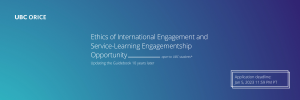
Thank you for your interest. The recruitment for this program has now closed.
Overview
The EIESL Revision Project Engagementship started in January 2022 and we are seeking applicants to join the existing team from January – April 2023.
Over a decade ago, a group of faculty, staff, and students began to convene to discuss shared questions and concerns related to international engagement and service-learning – particularly as it related to university activities of research, teaching and learning, and public engagement. Why was research being done in particular locations? How was it being done? By who? With who? Why were students motivated to participate in volunteer activities abroad? In global seminars or service-learning courses? How were immersive courses being framed and who was the learning meant to benefit? All of these questions and more led us to ask ourselves, how we could come together to critically think, dialogue, and act upon some of these questions. How could we hold ourselves accountable to a strong ethic of engagement? What did we mean by a strong ethic of engagement? And what resources existed to support this critical learning and reflection? This group secured TLEF funding to engage students, staff, faculty and community partners to develop the Ethics of International Engagement and Service-Learning (EIESL) project and its related community of practice.
The community and resources developed through EIESL have been a tremendous resource over the last decade, and now, we would like to engage a new cohort of students, staff, faculty, and community to dialogue and develop a 2.0 version that reflects current discourse grounded in the social, political, economic and ecological realities of our day. What does community engagement on global issues mean to you? What is the role of the academic institution on such issues? Has higher education’s role changed? How might we engage the campus community in a renewed conversation?
Scope
Beginning in September 2022, a team of 4 students (Cohort #3) commenced meeting 3-5 hours each week during the months of September – December 2022 further exploring the many ways that international (and local) engagement has changed over the years since launching the original EIESL guidebook, and considering how our ethical framework should also adapt to reflect this. The third cohort of this project met with some of the students involved in EIESL Cohort #1 and #2 to learn more about the process of engaging with this project and the initial questions/difficulties they encountered. Simultaneously, they are undertaking a deeper review and content analysis of the various EIESL resources and the work of previous cohorts to identify the opportunities and gaps. The team is currently planning for community participation regarding the directions for revision to date. This is expected to be a multi-stage project (approx. 2.5 years in duration) and will be coordinated through UBC ORICE (one of the original contributors to EIESL).
Project dates: Week of January 2023 to April 2023
Deliverables & Milestones
- Students are trained on research design overview, methods, and data analysis.
- Students will support the development of a participatory plan for re-engaging the wider UBC community on the overall project.
- Based on previous research and UBC community re-engagement, students will familiarize themselves with the literature review and resource analysis that has been conducted to understand the identified gaps and opportunities in the project’s ethical framework.
- Students will design a set of participatory research activities in term 2 to engage students, faculty and community partners in the work done by project cohorts to date.
- Students will be asked to provide a transitional report with a summary of the activities they have undertaken throughout the engagementship and recommendations for subsequent cohorts.
- The students will additionally give a short presentation to the team at ORICE about their key learnings.
Eligibility
- Be an enrolled undergraduate or graduate student (domestic or international) at the University of British Columbia.
- Demonstrate ability to think critically and creatively;
- Demonstrate ability to take initiative and work in a collaborative environment;
- Have access to a reliable internet connection and computer to collaborate with peers and attend remote meetings; meetings are likely to be a mix of in person and remote.
- Prior experience engaging with community organizations is an asset;
- Experience with participatory research project design and public speaking is an asset.
Applicants are also eligible to apply for the ORICE Experiential Education Accessibility Award. Learn more about the award below.
Academic integration:
- Please note this is a not-for-credit unpaid opportunity. If you are interested in making this a student-directed study course, please contact ubc.orice@ubc.ca to discuss the process to explore this option.
How to apply:
Thank you for your interest. The recruitment for this program has now closed.
Please reach out to us at ubc.orice@ubc.ca if you have any questions.